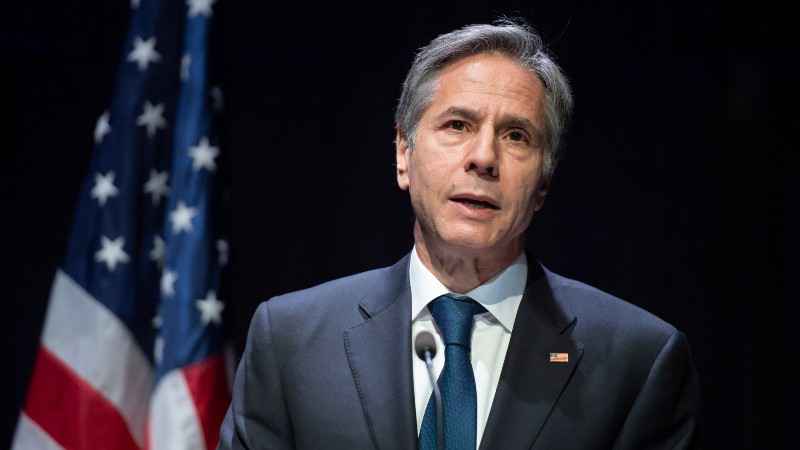Blinken off to Mideast to push peace talks after Gaza truce

In this May 18, 2021 photo, Secretary of State Antony Blinken speaks during a joint press conference following meetings with the Icelandic Foreign Minister Gudlaugur Thor Thordarson, at the Harpa Concert Hall in Reykjavik, Iceland. Blinken is heading to the Middle East to press the Israelis, Palestinians and regional players to build on last week’s Gaza cease-fire by laying the groundwork for a resumption in long-stalled peace talks.[Saul Loeb/Pool Photo via AP]
Secretary of State Antony Blinken is heading to the Middle East to press the Israelis, Palestinians and regional players to build on last week’s Gaza cease-fire by laying the groundwork for an eventual resumption in long-stalled peace talks.
President Joe Biden announced Blinken would depart on Monday for a short visit to Israel, the West Bank, Jordan and Egypt for what will be the Biden administration’s highest-level in-person meetings on the crisis that erupted earlier this month.
In a statement, Biden said Blinken will also work with regional partners to ensure “the coordinated international effort to ensure immediate assistance reaches Gaza.”
The administration had been roundly criticized for its perceived hands-off initial response to the deadly violence, including from Democratic allies in Congress who were demanding it take a tougher line on Israel and its response to rocket attacks from Palestinian militant groups in Gaza.
The administration has defended its response by saying it engaged in intense, but quiet, high-level diplomacy to support a cease-fire, which was ultimately arranged last week after Egyptian mediation.
Blinken said Sunday that the behind-the-scenes effort led by Biden paid off, securing a truce after 11 days.
“President Biden leading this effort made the judgment that we could be most effective in doing that. And ultimately, after this intensive effort across the government, we got to where everyone wanted to be, which was to end the violence,” he said in an interview with CNN.
“But now, as the president said, I think it’s incumbent upon all of us to try to make the turn to start to build something more positive, and what that means at heart is that Palestinians and Israelis alike have to know in their day in and day out lives equal measures of opportunity, of security, of dignity,” Blinken said.
He said the time is not right for an immediate resumption in negotiations between the two sides but that steps could be taken — mainly humanitarian initiatives — to repair damage from Israeli air strikes in Gaza, which caused significant damage to civilian infrastructure and deaths.
“I don’t think we’re in a place where getting to some kind of a negotiation for what ultimately, I think, has to be the result, which is a two-state solution, is the first order of business,” he said. “We have to start building back in concrete ways and offering some genuine hope, prospects, opportunity in the lives of people.”